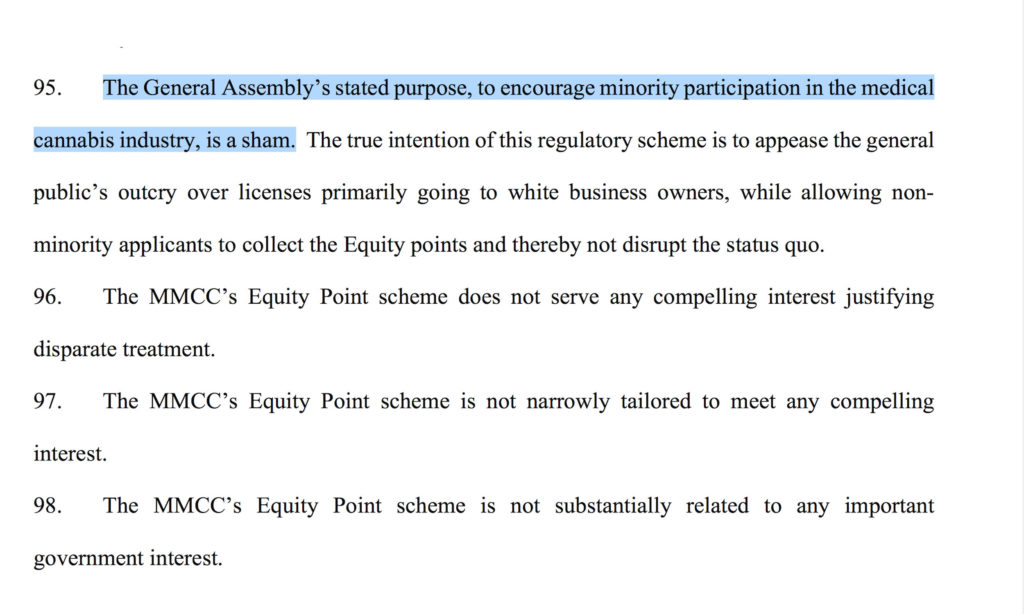A lawsuit has been filed against the Natalie M. LaPrade Maryland Medical Cannabis Commission on behalf of MediGrow LLC, a Prince George’s County-based cannabis company. The lawsuit, filed late last month, demands Maryland’s federal court address the MMCC’s application for medicinal cannabis growers and processors—specifically its equity questions—and says that the questions “are arbitrary, capricious, and in violation of the Fourteenth Amendment’s Equal Protection Clause.” In short, the lawsuit says MMCC did not adequately address equity and lacks transparency and clarity.
The lawsuit, filed by Kelly Burchell, a Washington D.C.-based lawyer and part of the firm Burchell Hughes, requests “$500,000.00 in compensatory damages, $500,000.00 in punitive damages, costs and attorneys’ fees, and any other remedy this Court finds appropriate.”
The million-dollar lawsuit is yet another challenge to the MMCC which continues to see the fallout from the fraught rollout of medicinal cannabis licenses in Maryland.
Once medicinal cannabis was approved in Maryland, all 15 grower and processor licenses were awarded to white business owners and many called attention to the program’s lack of racial equity. This was particularly concerning after the ongoing, decades-long war on drugs which has disproportionately incarcerated African-Americans for a drug that is now being sold in the state in a medicinal capacity in a market now cornered by white growers and processors.
In 2016, the Legislative Black Caucus began calling attention to the lack of diversity among the initial 15 medicinal cannabis licenses. So there was a racial disparity study which revealed, to the surprise of very few, that “findings are consistent with results that would be observed in a discriminatory market area.” Then in 2018, a House Bill was introduced to establish more licenses and ways to account for race in the application process—questions included in the application process that this MediGrow lawsuit is taking issue with (it should also be noted that former delegate Cheryl Glenn, who had been advocating for racial equity in medicinal cannabis, has been federally-charged with bribery tied to licenses).
In the fall of 2019, there was a lawsuit from the Remileaf company claiming that the MMCC did not process their application. A judge ruled that there would be restraining order that temporarily stopped the MMCC from giving out licenses.
Adjusting medicinal cannabis in Maryland’s equity issues continues. Currently, there is House Bill 1449, which would repeal the limit on the number of licenses the Maryland Medicinal Cannabis Commission can issue and essentially, open up medicinal cannabis in Maryland to the free market.
Assertions in MediGrow’s lawsuit regarding MMCC’s process are devastating. The lawsuit invokes the Fourteenth Amendment. Ratified in 1868, it is one of three amendments filed during reconstruction and specifically provided citizenship to all of those in the United States including those formerly enslaved and guarantees “equal protection of the laws.” And the lawsuit takes issue with how the MMCC has enacted and overseen its attempts at diversity. Namely, that the commission’s complicated process for rewarding equity points did not for example, take into consideration mental or physical disability or geographic diversity: “Ultimately, the MMCC enacted and applied an application rubric that rewarded sham indicators of diversity over true minority participation and the health and safety of Maryland citizens.”
Moreover, the lawsuit claims the commission and General Assembly’s approach is ineffective by design and exists only to placate concerns.
“The General Assembly’s stated purpose, to encourage minority participation in the medical cannabis industry, is a sham,” the lawsuit says. “The true intention of this regulatory scheme is to appease the general public’s outcry over licenses primarily going to white business owners, while allowing non-minority applicants to collect the Equity points and thereby not disrupt the status quo.”
As it applies to MediGrow—which identifies itself as a “minority-based business enterprise”—the lawsuit says that if MMCC continues the process, it will mean the company will “be deprived of substantial rights and privileges.” MediGrow argues that not being one of the chosen companies—for reasons deemed unfair and in violation of the fourteenth amendment—will cost them millions, hence the damages.
The lawsuit also requests an injunction to stop MMCC from awarding pre-approval for additional grower and processor licenses and criticizes the lack of transparency for Morgan State University, the third party hired to look at grower and processor applications. “There has been no transparency as to how the MMCC selected Morgan State University (MSU) to evaluate the applications,” the lawsuit says, adding that the MMCC did not comment on “the subject matter expertise” of MSU and did not provide evidence of the evaluators’ subject matter expertise.
“The public interest is also served by correcting a flawed administrative process,” the lawsuit says. “Holding the Commission accountable to fulfill its statutory responsibilities, exercise good judgment, not act in an arbitrary, capricious, unreasonable, or illegal manner, and engage in reasoned decision making will ensure effective oversight of the industry.”
You can read MediGrow v. Natalie LaPrade Maryland Medical Cannabis Commission here:

